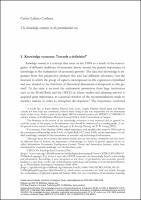Chapter The knowledge economy in the preindustrial era
| dc.contributor.author | Laliena Corbera, Carlos | |
| dc.date.accessioned | 2023-08-03T15:02:27Z | |
| dc.date.available | 2023-08-03T15:02:27Z | |
| dc.date.issued | 2023 | |
| dc.identifier | ONIX_20230803_9791221500929_13 | |
| dc.identifier.uri | https://library.oapen.org/handle/20.500.12657/74817 | |
| dc.description.abstract | The aim of this paper is to verify that in economies prior to the 18th century and from the Middle Ages onwards, there was a significant increase in the application of knowledge in the goods produced and a development of both technological and organizational innovation, i.e. "useful knowledge". It is also a question of verifying the effect of cultures, institutions and power structures on the generation of knowledge, its diffusion and its technological and productive use. In conclusion, the reduction of risk and the increase of productivity were aspects linked to the "knowledge economy" also in the pre-industrial era. | |
| dc.language | English | |
| dc.relation.ispartofseries | Datini Studies in Economic History | |
| dc.subject.classification | thema EDItEUR::J Society and Social Sciences::JH Sociology and anthropology::JHB Sociology | en_US |
| dc.subject.other | Knowledge economy | |
| dc.subject.other | middle ages | |
| dc.subject.other | early modern age | |
| dc.subject.other | modern age | |
| dc.subject.other | economic growth | |
| dc.title | Chapter The knowledge economy in the preindustrial era | |
| dc.type | chapter | |
| oapen.identifier.doi | 10.36253/979-12-215-0092-9.03 | |
| oapen.relation.isPublishedBy | bf65d21a-78e5-4ba2-983a-dbfa90962870 | |
| oapen.relation.isPartOfBook | 9f9bbbdd-c500-4575-9865-db2693689bc1 | |
| oapen.relation.isbn | 9791221500929 | |
| oapen.series.number | 3 | |
| oapen.pages | 28 | |
| oapen.place.publication | Florence |

